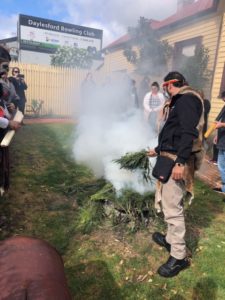It can be tempting to think that education begins when kids go to school, but in fact it is through play at home in the early years that the very foundations of life-long learning are laid. This is one of the foundations of the HIPPY program (Home Interaction Program for Parents and Youngsters); understanding that education doesn’t start at school, it starts from the day a child is born.
HIPPY is a two-year peer mentoring program that supports parents to become their ‘child’s first teacher’. The program is run in 100 sites across Australia and in 11 countries worldwide. It has a strong emphasis on play-based and place-based learning, encouraging parents to look for opportunities for learning in everyday situations. The tutors, who have previously been parents in the program, visit families in their home and role-model a range of activities parents can do with their child to support their early literacy and numeracy development. Parents and tutors also come together in group settings to do a range of activities to build social and emotional literacy.
In October, around 40 HIPPY tutors and co-ordinators came together to share their stories and experiences of parenting at the inaugural gathering of Victorian HIPPY tutors in Daylesford, Victoria.
 The day started with a Welcome to Country and a smoking ceremony by three traditional custodians of Dja Dja Wurrung country, the land on which we were meeting. It was a powerful and moving ceremony in which we were asked to think about the relationship of Australian First Nations peoples to each other, as well as our own relationship to the land.
The day started with a Welcome to Country and a smoking ceremony by three traditional custodians of Dja Dja Wurrung country, the land on which we were meeting. It was a powerful and moving ceremony in which we were asked to think about the relationship of Australian First Nations peoples to each other, as well as our own relationship to the land.
Innovative Resource had the privilege of facilitating the first session of the gathering, a ‘Strengths Approach Principles and Tools’ mini workshop. Participants were invited to notice their own strengths and the strengths of others using Strengths Cards for Kids. While parenting can be incredibly rewarding, it can also include times of stress, isolation, uncertainty and frustration. Becoming a parent can also mean that many of the things we did before, like work or hobbies, are placed on hold. When this happens it can lead us to question our sense of identity. Taking some time out to notice what we do well, our strengths and personal qualities, our skills and knowledge, our relationships and culture—all the things we value in ourselves and others—can help bring perspective, enhance confidence and build parenting skills.
 The conversation got underway very quickly when participants were asked to choose two cards that represented strengths they had as a child. Then they chose two cards for strengths they have now as adults. In pairs, each person spoke about the cards they chose, while their partner listened carefully to identify even more strengths in the person speaking.
The conversation got underway very quickly when participants were asked to choose two cards that represented strengths they had as a child. Then they chose two cards for strengths they have now as adults. In pairs, each person spoke about the cards they chose, while their partner listened carefully to identify even more strengths in the person speaking.
Participants then considered how they can support children through times of worry or anxiety, using the Body Signals cards and Anxiety Solutions for Kids. As HIPPY has a strong emphasis on supporting children in the year before they start school and their first year of school, the tutors spent time thinking about some strategies to support children through this transition to school.
To finish, the tutors shared stories about parenting using the Positive Parenting and Everyday Strengths. They also discussed how HIPPY is an inherently strengths-based program, with its focus on supporting parents to be positive role models in their child’s learning. Judging by the lively conversations, many stories were shared and strengths were noticed.

To find out more about the HIPPY program, visit the HIPPY Australia or HIPPY International websites.

